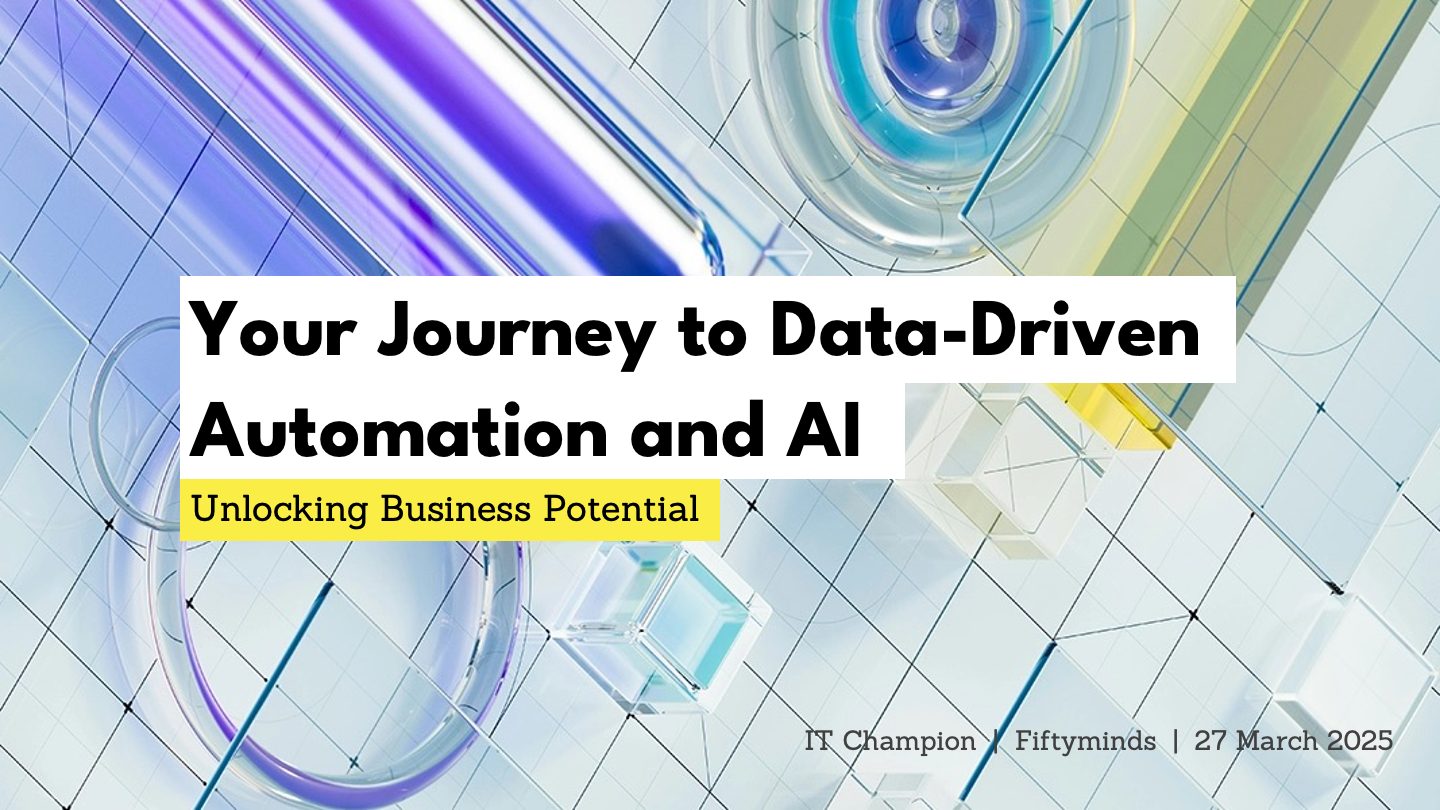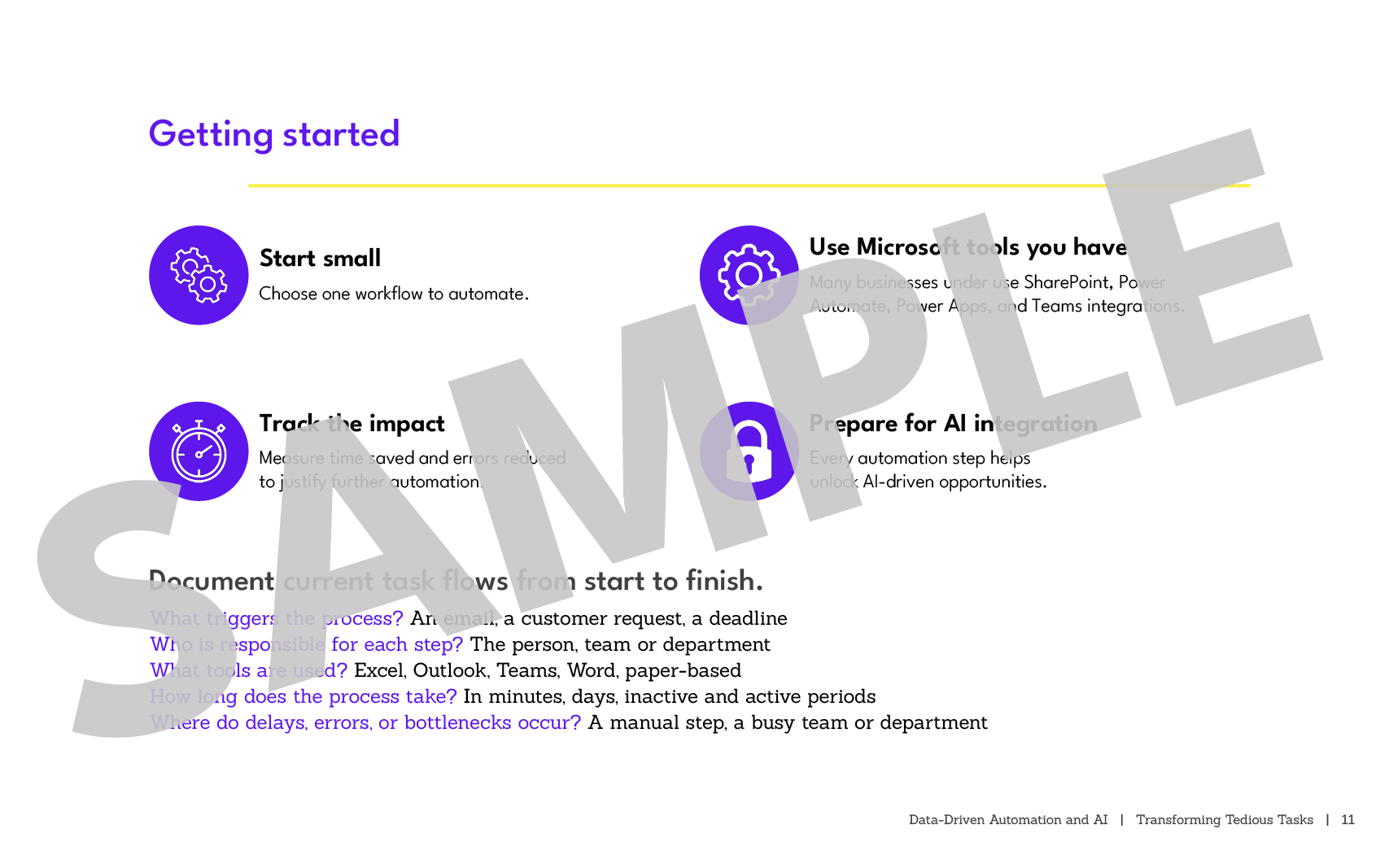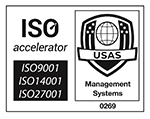Unlocking Business Potential
TLDR
IT Champion’s ‘Unlocking Business Potential’ blog shows how SMEs can use Microsoft 365 tools like Teams, SharePoint, and Power BI to streamline collaboration, automate workflows, and gain actionable insights. Cloud adoption reduces silos, strengthens security, and supports hybrid work—key for staying competitive in today’s digital economy.

Your Journey to Data-Driven Automation and AI
The Foundation of Modern Business Success: Data and Automation
Recent reports by Raconteur and TechInfo state that organisations that effectively harness their data and implement automation are pulling ahead of the competition.
But where do you begin if you’re looking to transform your operations with these powerful technologies?
In March, we hosted an insightful webinar featuring data and collaboration expert Shaun Gould alongside FiftyMinds founder Tia Collard, who shared practical strategies for businesses ready to embark on their data-driven automation journey.
This blog summarises the key insights from the webinar, providing actionable steps to prepare your organisation for successful automation.
Why Data Quality Is Your Most Valuable Asset
Before diving into automation tools or AI implementation, there’s a crucial first step that many organisations overlook: ensuring your data is ready.
As Shaun Gould emphasised during the webinar, “Clean, structured data is the foundation upon which all successful automation is built.” Without high-quality data, even the most sophisticated automation tools will struggle to deliver meaningful results.
The reality for many businesses is that their data exists in various formats across multiple systems—from spreadsheets and email inboxes to CRM systems and cloud storage. This fragmentation creates significant barriers to effective automation and limits the insights you can extract from your information.
Mapping Your Data Journey: From Chaos to Clarity
The path to data readiness involves three essential phases:
Data Cleaning
Involves identifying and correcting inaccuracies in your existing data. Common issues include:
- Duplicate entries
- Outdated information
- Inconsistent formatting
- Missing fields
Taking the time to establish data quality standards and implement regular cleaning processes pays dividends when you later implement automation tools.
Data Integration
Once your data is clean, the next challenge is ensuring it flows seamlessly between systems. Modern businesses typically use multiple platforms—Microsoft 365, CRM software, accounting systems, and more—which need to communicate effectively.
Integration tools can create bridges between these systems, eliminating manual data transfer tasks and ensuring all team members have access to up-to-date information regardless of which platform they’re using.
Data Management
Maintaining data quality is an ongoing process, not a one-time project. Effective data management requires:
- Clear ownership of data assets
- Documented processes for data entry and updates
- Regular audits to catch and correct issues
- Training for team members to ensure consistent practices
These foundations prepare your business to implement automation confidently and effectively.
Identifying Opportunities for Automation
With quality data in place, you can begin identifying which processes are ripe for automation. During the webinar, Tia Collard shared a practical approach to spotting these opportunities:
“Look for the tasks that your team members complain about—the repetitive, time-consuming activities that don’t require creative thinking or strategic decision-making.”
Common processes that benefit from automation include:
Invoice Processing and Approvals
Using Optical Character Recognition (OCR) technology, businesses can automatically extract data from incoming invoices, match them against existing records, and trigger approval workflows—all without manual data entry.
Email Routing and Responses
AI-powered tools can analyse incoming emails, understand their intent, and either route them to the appropriate team member or generate relevant responses automatically.
Report Creation
Instead of spending hours compiling data from various sources into reports, automated systems can pull information from connected platforms and generate comprehensive reports with minimal human intervention.
Realising the Benefits: How Automation Propels Business Growth
The benefits of implementing data-driven automation extend far beyond simply saving time. Businesses that successfully navigate this journey typically experience the following:
Enhanced Customer Experiences
With administrative tasks automated, team members can focus more attention on delivering exceptional service and building relationships.
Reduced Errors
Automated processes eliminate the human errors that inevitably occur during repetitive manual tasks, improving accuracy and consistency.
Faster Decision Making
When quality data is readily available and insights are automatically generated, leaders can make informed decisions more quickly.
Scalable Operations
Automated systems can handle growing workloads without requiring proportional increases in staffing, allowing businesses to scale more efficiently.
Competitive Advantage
Organisations that leverage their data effectively gain insights that help them identify market opportunities ahead of competitors.
Starting Your Data-Driven Transformation
If you’re inspired to begin your journey towards data-driven automation, here are some practical next steps:
- Conduct a data audit to understand what information you currently have and where it’s stored
- Identify pain points in your current workflows that consume excessive time or create frustration
- Start small by choosing one process to automate as a proof of concept
- Invest in training to ensure your team understands how to work with automated systems
- Measure results to quantify the impact of your automation efforts
The Human Element in Automation Success
While technology is at the heart of automation, successful implementation always depends on people. As highlighted during the webinar, fostering a culture that embraces technology change is essential.
“Automation works best when it enhances human capabilities rather than replacing them,” noted Tia Collard.
“The most successful projects are those where team members clearly understand how automation will make their work more meaningful by eliminating the mundane tasks they don’t enjoy.”
Your Ongoing Transformation Journey
Implementing data-driven automation isn’t a destination but a continuous journey of improvement. Organisations that see the greatest benefits are those that approach automation with curiosity and flexibility, constantly seeking new opportunities to enhance their processes.
By focusing first on data quality and integration, and then thoughtfully implementing automation for suitable processes, your business can achieve significant improvements in efficiency, accuracy, and growth potential.
This blog post summarises key insights from IT Champion’s webinar “Unlocking Business Potential: Your Journey to Data-Driven Automation and AI” featuring Shaun Gould from IT Champion and Tia Collard from FiftyMinds.
About the Experts
Shaun Gould is IT Champion’s Data and Collaboration expert, specialising in helping organisations revolutionise their data management and workflow processes. He brings extensive experience in transforming how businesses store, protect, and leverage their data to create secure platforms that enhance both customer and employee experiences.
Tia Collard is the founder of FiftyMinds, dedicated to demystifying AI and automation for businesses of all sizes. She specialises in transforming complex technology into straightforward, accessible tools that drive real business growth, helping organisations from family-owned businesses to ambitious SMEs harness the power of AI without the overwhelmed.
About the Author
The IT Champion Service Delivery Team works behind the scenes to make sure customers receive dependable, friendly and effective IT support every day.
Their posts share real‑world updates on service performance, improvements and new developments that impact customers directly.





